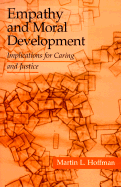Book contents
- Frontmatter
- Contents
- Acknowledgments
- 1 Introduction and Overview
- Part I Innocent Bystander
- 2 Empathy, Its Arousal, and Prosocial Functioning
- 3 Development of Empathic Distress
- 4 Empathic Anger, Sympathy, Guilt, Feeling of Injustice
- Part II Transgression
- Part III Virtual Transgression
- Part IV Is Empathy Enough?
- Part V Empathy and Moral Principles
- Part VI Culture
- Part VII Intervention
- References
- Author Index
- Subject Index
3 - Development of Empathic Distress
Published online by Cambridge University Press: 05 June 2012
- Frontmatter
- Contents
- Acknowledgments
- 1 Introduction and Overview
- Part I Innocent Bystander
- 2 Empathy, Its Arousal, and Prosocial Functioning
- 3 Development of Empathic Distress
- 4 Empathic Anger, Sympathy, Guilt, Feeling of Injustice
- Part II Transgression
- Part III Virtual Transgression
- Part IV Is Empathy Enough?
- Part V Empathy and Moral Principles
- Part VI Culture
- Part VII Intervention
- References
- Author Index
- Subject Index
Summary
As I mentioned earlier, empathic distress seems like a simple response: One feels distressed when observing someone in actual distress. When we look at empathic distress in mature observers, however, its complexity is quickly apparent. First, empathic distress in mature observers includes a metacognitive awareness of oneself as responding empathically: One not only feels distressed but knows this feeling is a response to something unfortunate happening to someone else and to what one assumes to be the victim's feeling of pain or discomfort. Mature empathizers have thus passed the developmental milestone of acquiring a cognitive sense of themselves and others as separate physical entities with independent internal states, personal identities, and lives beyond the situation and can therefore distinguish what happens to others from what happens to themselves.
Second, mature observers have a sense of how they would feel and a general understanding of how most people would feel in the other's situation. Third, mature observers know that the other's outward behavior (facial expression, posture, voice tone) can reflect how he feels internally but they also know that these outward expressions of feeling can be controlled to some extent and mask the other's internal feeling. Furthermore, all of this knowledge plus any personal information a mature observer has about the victim are likely to be quickly integrated into an explanation of the cause of the victim's plight. In short, for a person to experience mature empathic distress, he must have a clear distinction between what happens too thers and what happens to himself and an understanding of how feelings are expressed and how they are shaped by events.
- Type
- Chapter
- Information
- Empathy and Moral DevelopmentImplications for Caring and Justice, pp. 63 - 92Publisher: Cambridge University PressPrint publication year: 2000
- 3
- Cited by



